While working with the University Archives collections to research a recent exhibit (the exhibit — “Gone Into History” — ends on Friday, April 27), I learned about Professor Lillian Cohen. And her story struck me hard and showed once again how touching and maddening archival research can be.
I first “met” Professor Cohen when I read her March 5, 1946 letter to University Librarian E.W. McDiarmid, who also served as University Archivist and had asked Professor Cohen about acquiring her personal papers for University Archives at the time of her retirement.
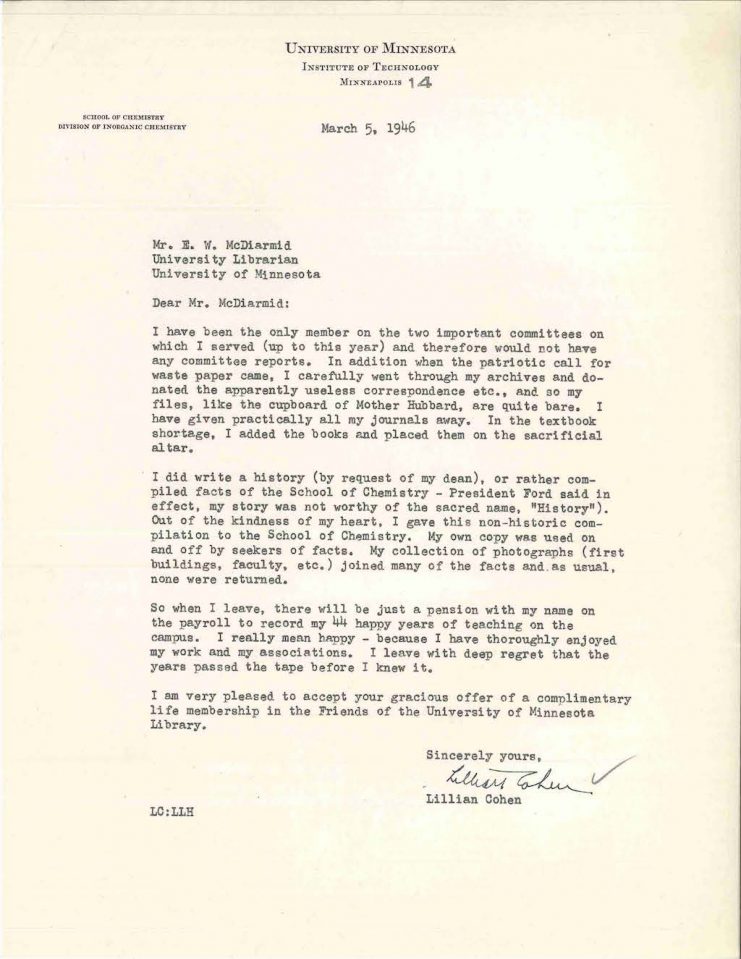
Letter from Professor Lillian Cohen to University Librarian E.W. McDiarmid in 1946 indicating she would not have any materials to provide the University Archives upon her retirement.
A study of her career and her experiences as a chemist, scholar, and mentor could reveal much about the academy and the University in the early decades of the 1900s. But as Dr. Cohen noted when she retired in 1946, “…there will be just a pension with my name on the payroll to record my 44 happy years of teaching on the campus.”
I knew there was more to “record” her 44 years.
For decades, memorial statements honoring faculty who have passed away were regular features in the Minutes of the University Senate meetings. A quick search of the University Digital Conservancy brought me to the statement honoring Lillian Cohen in the November 17, 1949 minutes.
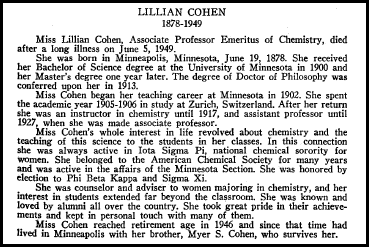
University of Minnesota Senate memorial statement regarding the death of Professor Lillian Cohen in 1949.
A couple of sentences stayed with me, “Miss Cohen’s whole interest in life revolved about chemistry and the teaching of this science to the students in her classes…She was a counselor and adviser to women majoring in chemistry, and her interest in students extended far beyond the classroom. She is known and loved by alumni all over the country.”
Reading the fond summary of her career at first infuriated me knowing that Professor Cohen’s voice is not a part of the University Archives collections. But she is here. Perhaps not with as much to say as her personal papers would have offered, but Lillian Cohen can be heard.
The 1900 Gopher yearbook, published the year she received her undergraduate degree from the University, includes Lillian Cohen’s Situation Wanted notice, “As general assistant in scientific lines.” The 1910 Gopher includes a section of poems, drawings, and what look to be inside jokes by and for the women on campus, and Lillian Cohen contributed a poem to the section.
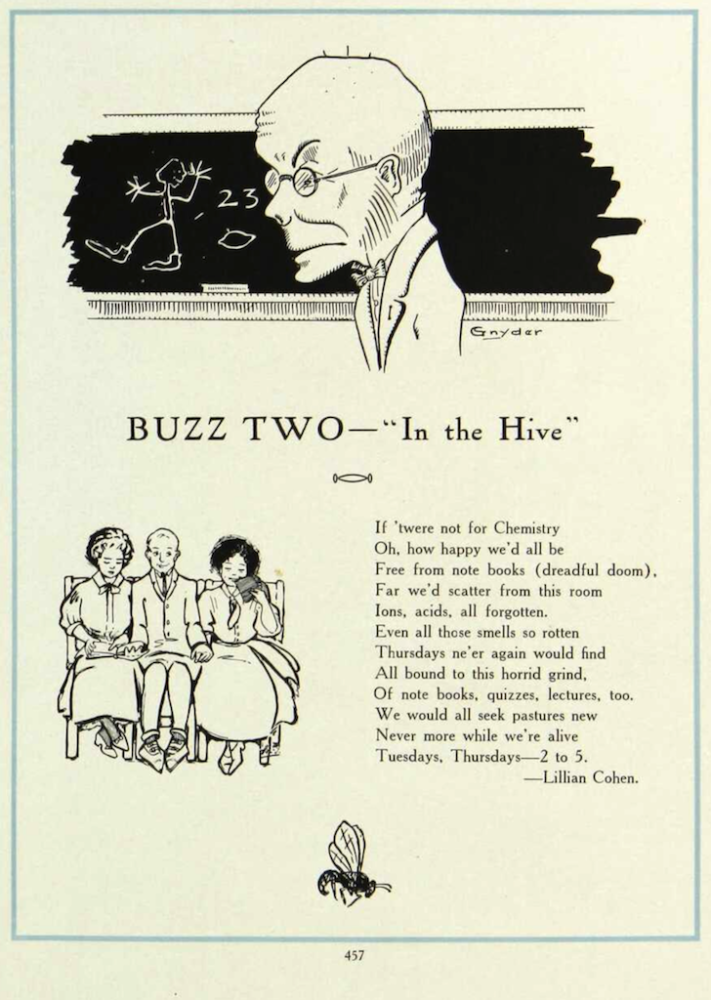
Poem about chemistry written by Lillian Cohen while an undergraduate at the University of Minnesota published in the 1910 Gopher yearbook.
Numerous Gophers note her membership as a student and as a professor in Iota Sigma Pi, the honorary women’s chemistry society; Mortar Board, an organization recognizing senior women students for outstanding scholarship, leadership and service to their colleges and universities; and Sigma Xi, an honorary society for scientists and engineers.
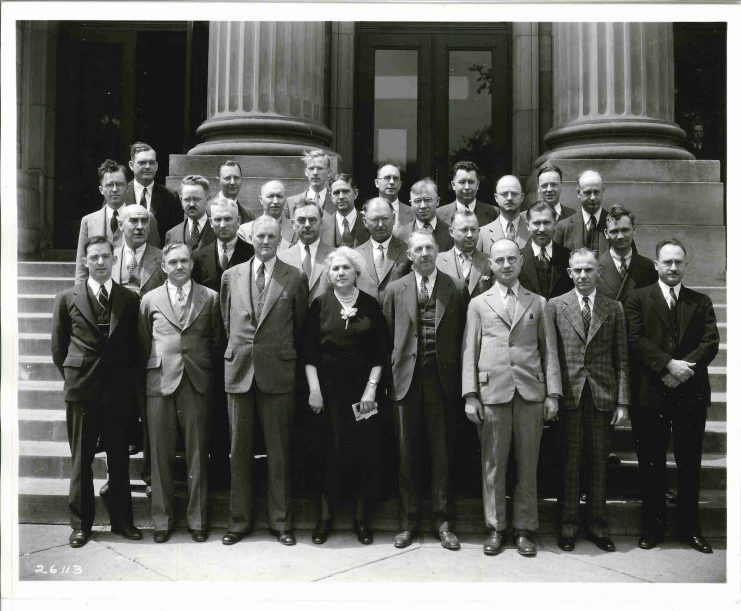
Photograph of the University of Minnesota Department of Chemistry faculty in 1936. Lillian Cohen is pictured front row center.
Later in her career, Professor Cohen was featured in faculty sections of the Gopher.
In the Department of Chemistry and at the University, Lillian Cohen was admired as a chemist, scholar, and mentor and she was “…known and loved by alumni all over the country.”
Professor Cohen passed away June 5, 1949.
A few decades later, concerns about and legal action aimed at gender equity shed light on discrimination at the University and the experiences of women on the faculty. An article in the December 1980 issue of Report, a newsletter for University faculty and staff, notes that as one part of a University sexual discrimination settlement, the first woman on the Department of Chemistry faculty had been hired. In the next issue of Report for January 1981, the following correction appears.
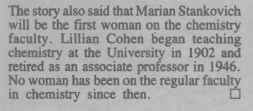
Correction run in the January 1981 publication The Report indicating Professor Cohen’s place in Department of Chemistry history.
The correction was made, perhaps in part by a review of another University newsletter for staff and faculty, Update, which ran a story in its Fall 1975 issue entitled “Women scientists at Minnesota: long skirts and muddy paths” that featured Lillian Cohen as the “Chemistry Department’s first woman professor.”
The events and people that make up the history of the University of Minnesota often become muddled and ignored over time. Researching and curating an exhibit gave me the responsibility and honor of uncovering a few of those stories and showing that the stories may have gone into history, but they are not lost.
—Erin George is the University Archives Research Services Archivist. To learn more about the University of Minnesota Archives, please visit www.lib.umn.edu/uarchives.


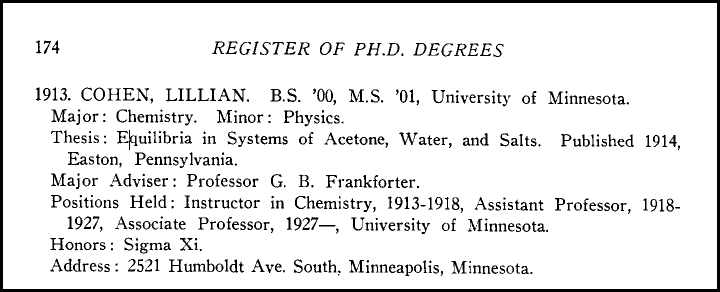
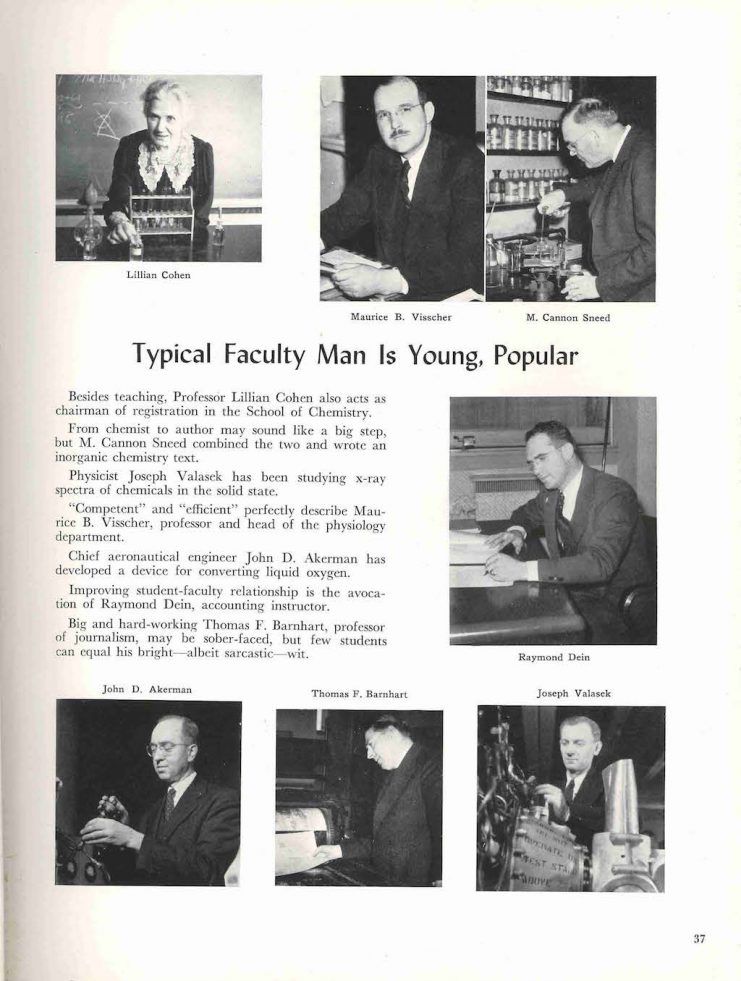
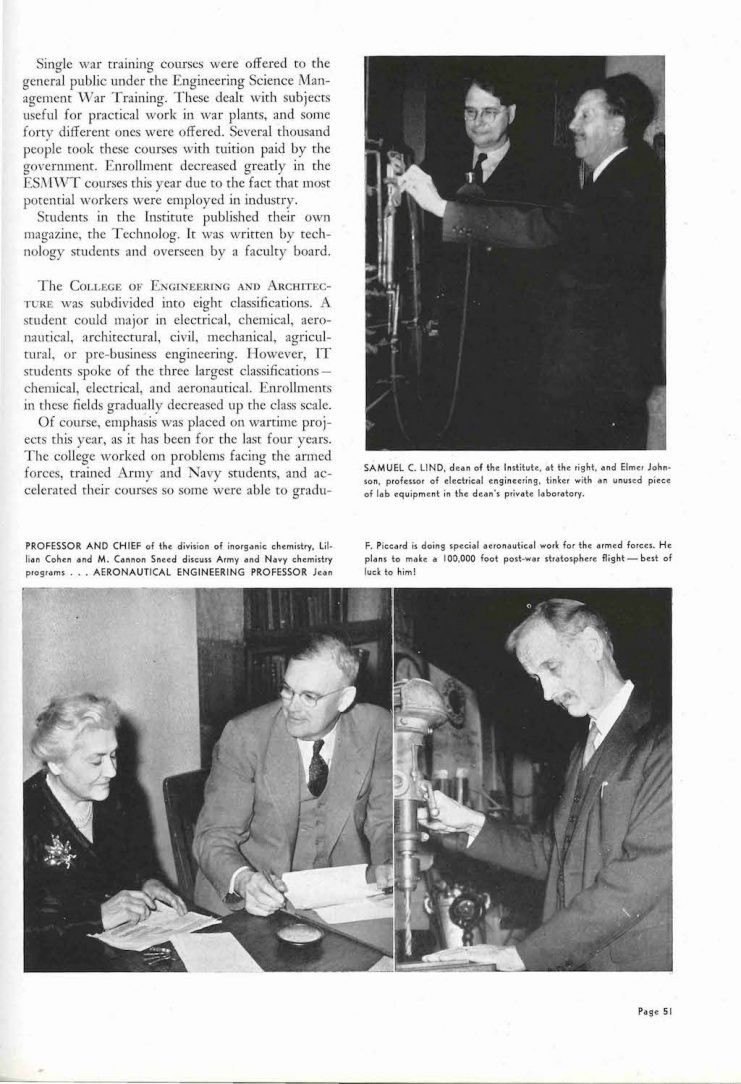
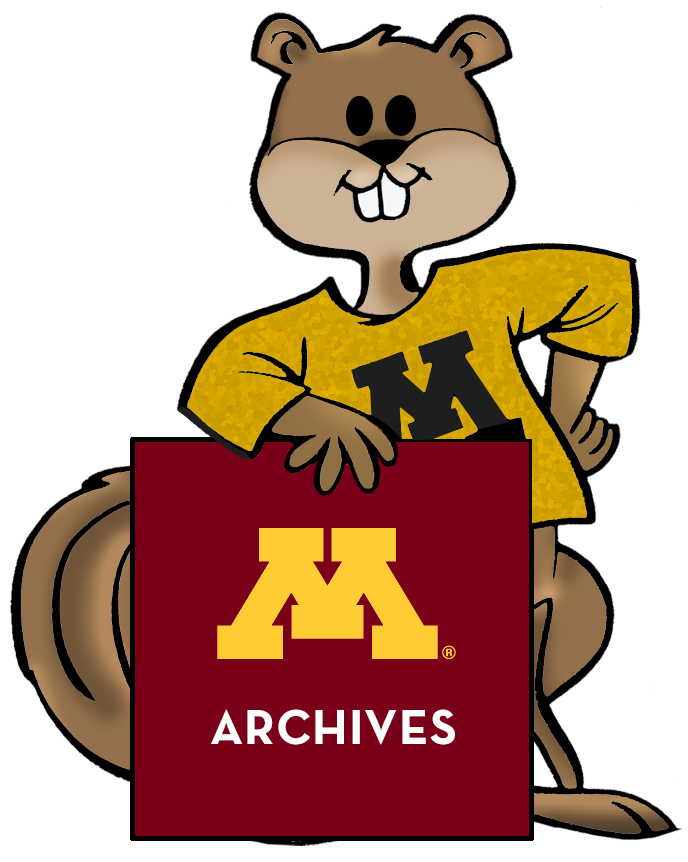



Professor Cohen’s 1946 letter to McDiarmid, replicated here, contains some of the sharpest, most acrid, even bitter language I’ve seen in a reply to a request for her archival materials. She said, in effect, my years here have netted nothing. I gasped when I read what she quotes President Ford as saying, and at the fact that she was alone on at least several committees. Wow. It rings very, very true, though.
Her story must go beyond mere facts of her professional activities, to possible really awful acts of bigotry and discrimination, and at the minimum, firm exclusion from the larger faculty in-group–note what she says about her committee work! I was a faculty member at the U from 1965 to 2005, in CLA, and heard or read a number of stories of really heinous stuff done in IT to female faculty members (apparently by men on the faculty who wanted those women to know how despised they were). I was among those who benefited from the Rajender lawsuit settlement (her IT department had refused to consider her for a regular appointment) where she won salary increases for all women faculty as part of the U’s atonement for systematic underpayment of women faculty, over years.
Here’s a note the might indicate how “the typical faculty member” was a man, into the late 1960s: When I came to the U in the Fall of 1965, I received an invitation to a meeting/reception of the Faculty Women’s Club at the U of M President’s house, hosted by his wife. I was totally out of place; the question I got repeatedly was, “What department is your husband in?” It got very tiresome to have to repeat “I’m not married, and I myself am on the faculty of. . . .” I never went back, of course, realizing that there had not been any “faculty women” for some time, just faculty wives.
Perhaps there’s more about Dr. Cohen in historical issues of the MN Daily, where what’s printed didn’t always stick to the celebratory, which is what gets included in the Gopher or departmental histories. Is the Daily digitized?
Thanks for telling us of Professor Cohen’s existence at the U!
Thank you for sharing this information. Faculty Women’s History at the University of Minnesota is of interest to me. I have been opening some very very thin files lately and have been discouraged. You have given me new paths to explore.